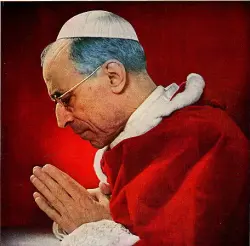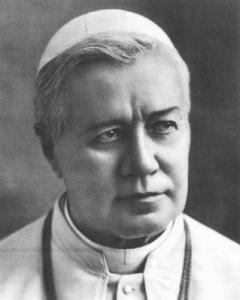Ecclesia Supplet
Most of my readers are certainly familiar with the concept of supplied jurisdiction, so I will waste time on this. I would like, however, to make some considerations for the “legalist” crowd.
So, you think the SSPX has no supplied jurisdiction, and any confession or marriage celebrated by them is not valid. Why would you, then, go to confession by them after the 8 December and for around one year afterwards? Why would you go to confession to people you consider abusing their priestly role by doing things they are explicitly not allowed to do, and even deceiving the sheep about the validity of their confession or their marriage?
Apart from very rare, rather extreme examples, in which I believe the SSPX priest has jurisdiction even for the Vatican (say: man about to die, no Novus Ordo priest around for the Last Rites) the answer can only be one: because they are so beautifully, authentically Catholic.
Which, truly, answers the question about the supplied jurisdiction once and for all. These are perfectly Catholic priests doing nothing else than perfect (ahem, almost perfect if you ask me) Catholic work. There can be no doubt on their being 100% orthodox. There can be no doubt on their obedience to ecclesiastical authority whenever this does not contravene to a higher loyalty, the one to God. There can be no doubt the metre with which the SSPX measures this higher loyalty is nothing else that Catholic tradition in its purest form, as opposed to the orgy of Neomodernism (or worse) en vogue in Rome.
How can you, therefore, say that these disobedient people are your example of Catholicism, which is, in the end, obedience to the Lord? Are they being obedient to the Lord? Then they most certainly have supplied jurisdiction. Are they not obedient to the Lord? Then you should not approach them during the Year of False Mercy.
Ecclesia Supplet. When a Catholic is not allowed by his bishop or his Pope to do the Catholic thing, he does it nevertheless, with many greetings to the Pope or bishop. Athanasius did it, Eusebius did it, and Marcel also did it. I am pretty sure many others simple priests found themselves in similar situations and did the right thing, particularly during the Arian troubles, because I can't imagine that there weren't many priests ready to say exactly this: Ecclesia supplet. If you are a truly Catholic priests, and your bishop tells you that you must recite a different Creed at Mass – because some of the pewsitters might be offended by the old one – you know exactly what directions you will give to him, and that's that.
The SSPX have supplied jurisdiction, or they haven't. If they have, you certainly don't need Francis to tell you what they can or cannot do. If they cannot they are at least disobedient and probably gravely sinful people, and then you should avoid them anyway.
M
Posted on September 2, 2015, in Catholicism, Conservative Catholicism, FSSPX, Traditional Catholicism and tagged ecclesia supplet, SSPX. Bookmark the permalink. 18 Comments.




















How do you explain to ‘The Man in the Pew’: that on particular day @ 23:55 the SSPX priest cannot absolve sin and at 00:05 the next day he can. Jump 365 days: the situation is reversed. The cat is out of the bag and cannot be put back!
That can be explained, but the explanation is not satisfactory. Those who believe the Church can give and take jurisdiction to the SSPX will say that it is for Rome to decide if and when and on what occasion and for how long something is allowed.
But this is not a satisfactory answer, because it does not answer the fundamental question of whether these SSPX are Un-Catholic (absurd) or extremely orthodox (which in the end pretty much everyone thinks).
One can’t, rationally – because it is absurd.
Well said. The denial of Tradition and bowing to the modernist whims makes for abandonment of reason. The Catholic Faith is never irrational.
Unfortunately I cannot agree. ” There can be no doubt on their obedience to ecclesiastical authority whenever this does not contravene to a higher loyalty, the one to God.”
The Church (the body of Christ) has never asked anyone to do anything immoral. Genesis 22: After these things, God tempted Abraham, and said to him: Abraham, Abraham. And he answered: Here I am. [2] He said to him: Take thy only begotten son Isaac, whom thou lovest, and go into the land of vision: and there thou shalt offer him for an holocaust upon one of the mountains which I will shew thee….
You reason like a Protestant, as your scriptural quote proves.
Pope Liberius ordered Athanasius to ditch the Creed in favour of an heretical version. This is just one example, there are infinite others. Get your facts straight.
I think you’re creating a false choice. I can now go an SSPX priest for confession without having to wonder if their supplied jurisdiction position is true or just a pile of self-serving malarkey. When the Year of Mercy is over, I can stop going to their priests because I’m not convinced about their jurisdiction argument, and do not wish to risk my eternal soul on their say-so. Their whole “necessity” argument, after all, implies that no regular priest in a diocese (or even an FSSP priest in a diocese where the SSPX exists!) is “good enough” “orthodox enough” to confer a valid sacrament of penance or witness a marriage. This smacks of an old error called Donatism.
Kudos to the Pope for granting faculties to the SSPX; but this grant proves he does NOT accept the SSPX’s position that it already has faculties, otherwise there would be no reason for him to grant them. I think the SSPX have a huge role to play in Catholic restoration. I just can’t buy this ridiculous claim of supplied jurisdiction.
You are inferring what the SSPX does not say, and are throwing around easy accusations of heresy against very orthodox Catholics.
By the way, the very act of allowing the SSPX priest to validly confess is an indirect confirmation of that very supplied jurisdiction you deny. Therefore, even Francis gets the SSPX right compared to you, because if he considered them Donatists they would obviously not get the ability to validly confess.
M
+++Muller is on record as stating that Mother Church faces a split of Reformation proportions. +++Sarah opines that +++Marx [and presumably other German Hierarchy] are guilty of Heresy in deed the evidence if such is clear to see. A number of cardinals have joined to counter the +++Kasper/Marx and suspetec Franciscus position.
And we are arguing about Faculties, possibly from a Local Ordinary who is of Potestant persuasion.
Talking about the band playing whilst the ship sinks – you are all mad.
Not really.
The question of faculty is important because it is a necessary step in the proper understanding of Catholicism.
The correct thinking that allows you to understand that the SSPX has faculties is the same one that can be applied to all the questions not only within the Church, but of our time.
M
But ‘Faculties’ could and may well have been denied out of spite – much as the reaction to Msgr. Lefebvre’s original seminary. If I am correct, it was given appropriate approval, with outside pressure then resulting in the withdrawal of such approval. Diocesan clergy were lied to regarding the status of the ‘Old Mass’, with some, at that time, persecuted for standing their ground and some victimised even to-day. Weak and or Modernist bishops succumbing to pressure from certain clergy associations to counter efforts to bring back the ‘Old Mass’. The NOM is, obviously, licit, but eschewing somewhat arcane arguments, just compare the prayers at The Ablutions, of the two rites, to understand where the truth lays. The German Bishops’ Conference is reported to be racing headlong into schism – what price ‘Faculties’ from that mob?
Yes, faculties were given and then taken away when the SSPX refused to comply with the order to close the seminary.
Again, it is very simple: jurisdiction can be given outside of the usual hierarchical channel, because it flows directly from the necessity to save souls.
Every reasoning based purely on the Vatican having withdrawn jurisdiction from the SSPX simply ignores what “supplied jurisdiction” is.
M
“So, you think the SSPX has no supplied jurisdiction, and any confession or marriage celebrated by them is not valid. Why would you, then, go to confession by them after the 8 December and for around one year afterwards? Why would you go to confession to people you consider abusing their priestly role by doing things they are explicitly not allowed to do, and even deceiving the sheep about the validity of their confession or their marriage?”
I will try to answer your question, and I mean so sincerely, with no snark attempted. I have great sympathy for the SSPX but am not an SSPX attendee. My answer:
Because I don’t accept the second premise you state. I believe that SSPX priests act with subjective good will, and have a good faith belief in their ability to absolve through supplied jurisdiction. I disagree with the objective fact at issue, they actually have that supplied jurisdiction in most cases. But any person who acts out of a sincere desire to please God deserves my respect.
The great news about the Pope’s action is to remove the doubt in the mind of Catholics who in good faith might not wish to risk an absolution that might not occur. After all, all of our souls are at stake, too. So, give some of the non-SSPX Catholics some credit for good faith, too. Hence, I would be one to go to confession there after December 8, and I thank God that the Pope has removed any shadow of a doubt about doing so.
But I assure you that I very much hope that the SSPX is right and I am wrong about whether they have the jurisdiction to absolve based upon their theory. I greatly look forward to the day when all of their laudable activities are free from the cloud of uncertainty, however unfairly and by whom the uncertainty was created.
Finally, I can understand how one who supports the SSPX would have good reasons for doubting the sincerity or good will of a non-SSPX Catholic, or even of this Pope. But whatever the Pope’s motivations, this is an act that is good, insofar as it goes. And there are many Catholics outside the SSPX communities who wish it very well indeed. I am among them.
Oremus pro invicem.
I do not think you are thinking this to the end. The SSPX priest are extremely well-trained ” Church professionals”. The “but they are in good faith” argument that would apply to an extent to a layman does not apply to them. If they are wrong, they are rebels. It’s not what “they feel”, it’s a matter of stone-hard reality. In other words, we cannot in good conscience say that serious priests can get it so wrong in a matter do important as obedience, and at the root of their very existence. If they are serious priests, they must get it right. If they get it wrong, we can’t consider them serious priests.
M
As to the last paragraph, we must pay attention even to apparent good deeds: Satan does not hesitate to tolerate a superficial “good” in order to make a bigger damage. Look at all those Medjugorje people queueing before the confessional!
M
The SSPX would have regular jurisdiction but for its refusal to compromise on matters of principle – matters lying at the very heart of the ongoing crisis in the Church. Perhaps the best example would be the refusal of the SSPX to concede that the new liturgy is licit.
If you accept that the SSPX is correct on its principled stand, then an arguing against supplied jurisdiction for its sacraments requires believing that the hierarchy is actually empowered to use the law as a tool to compel obedience contrary to truth. Effectively, you must believe that the Church is constituted such that a wicked pope could legitimately say to a clergyman, “Condone my wickedness or I will not let you minister to the faithful.” Likewise, you must believe that a wicked pope can legitimately sentence the faithful to only have recourse to clergy willing to condone his wickedness.
If you disagree that the SSPX is taking a stand based on true principles, then naturally you will disagree with their argument that jurisdiction is supplied by virtue of the same state of necessity that justifies their “disobedience” in the first place. However, the far more compelling arguments I have heard from canon law establish that jurisdiction would still be supplied, albeit on different grounds (e.g., common error – which does not require that anyone actually be in error as to whether a priest has jurisdiction). You might still argue that the faithful materially sin by approaching SSPX clergy for the sacraments requiring jurisdiction (and the clergy sin in offering them), but enough nonsense about invalidity.
The matter is so suspicious. This wicked pope is very manipulative that I don’t trust him at all. He may use SSPX as his purpose to cause chaos in the Church, divide and get rid of conservatives and orthodox Catholics by letting them clash each others. May God save the Church.
United we stand diverted we fall!